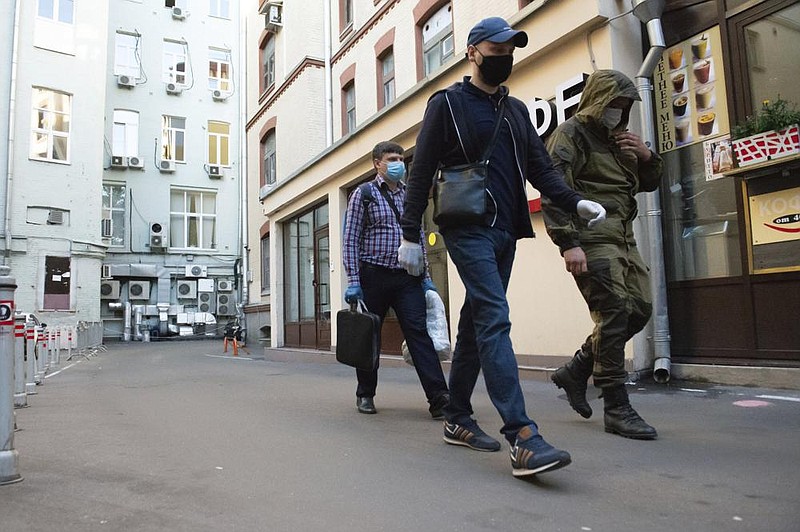Opposition activists pursued in Russia
MOSCOW — Russian law enforcement agents Thursday searched the apartments and offices of several opposition activists who campaigned against constitutional amendments that allowed President Vladimir Putin to extend his rule until 2036.
Investigators searched the apartment of municipal lawmaker Yulia Galyamina and also raided offices and homes of several activists who took part in the “No!” campaign over the July 1 constitutional vote, in which nearly 78% of voters approved the changes that allow Putin to seek two more terms.
The raids come ahead of a protest against the amendments that the activists planned for Wednesday in Moscow and St. Petersburg. Authorities have denied permission, citing a ban on public gatherings during the coronavirus pandemic.
Investigators also searched the offices of the MBK Media news outlet and the Open Russia group that are funded by self-exiled tycoon and Kremlin foe Mikhail Khodorkovsky, and detained several activists.
Officials said the searches were linked to a new investigation into Khodorkovsky’s Yukos company, but activists at both MBK and Open Russia saw them as an official response to their campaign against the constitutional vote.
U.S. urged to restart talks with N. Korea
SEOUL, South Korea — South Korea on Thursday asked a visiting senior U.S. envoy to try to revive stalled nuclear diplomacy with North Korea, which has refused to resume talks because of what it calls hostile U.S. policies.
Deputy Secretary of State Stephen Biegun, the top U.S. official on North Korea, has been in Seoul for talks since Tuesday. He was to head to Japan later Thursday.
During a meeting with South Korea’s newly appointed presidential national security adviser, Suh Hoon, Biegun stressed the importance of a resumption of talks between Washington and Pyongyang and agreed to maintain close coordination with Seoul, the presidential Blue House said in a statement.
Suh appraised Biegun’s efforts to restart the U.S.-North Korean diplomacy and asked him to continue those efforts, the statement said.
After meeting with other Seoul officials Wednesday, Biegun suggested that Washington remains open to talks with Pyongyang. But he also accused a senior North Korean nuclear negotiator who had blamed the deadlocked talks on American hostility of being “locked in an old way of thinking.”
North Korea has previously demanded the U.S. lift international sanctions and provide security guarantees if it’s committed to talks.
Facial-recognition outfit under scrutiny
LONDON — Privacy watchdogs in Britain and Australia have opened an investigation into facial recognition company Clearview AI over its use of personal data “scraped” off social media platforms and other websites.
Thursday’s announcement by the U.K.’s Information Commissioner’s Office and the Office of the Australian Information Commissioner adds to the global regulatory scrutiny faced by the New York-based startup.
“The investigation highlights the importance of enforcement cooperation in protecting the personal information of Australian and U.K. citizens in a globalized data environment,” the regulators said in a brief statement.
Clearview AI came to attention after investigative reports detailed its practice of harvesting billions of photos from social media and other services to identify people.
CEO Hoan Ton-That said in a statement that Clearview “searches publicly available photos from the internet in accordance with applicable laws. It is used to help identify criminal suspects.”
The CEO noted that the technology is still unavailable in the U.K. and Australia and said the company will cooperate with regulators.
Germans told to be wary of Chinese tech
BERLIN — Germany’s domestic intelligence agency is warning consumers that personal data they provide to Chinese payment companies or other tech firms could end up in the hands of China’s government.
In its annual report released Thursday, the BfV agency noted that Chinese government offices have access to data stored in China by companies such as Tencent and Alibaba, “as well as other apps, web services and mobility providers such as for example [bike-sharing] providers” that operate in Germany.
The head of the BfV, Thomas Haldenwang, said German’s data isn’t safe with Chinese companies because they are required by law to provide the data to their government.
Germany’s top security official also expressed concern about what he called the “hybrid threat” from China, which included the purchase of key German companies.
“When it comes to critical infrastructure, in the energy supply or now with 5G lines, we have to consider how we can protect ourselves,” said Horst Seehofer, Germany’s interior minister.
Seehofer added that Germany has yet to reach a “political decision” on whether to let Chinese telecoms equipment company Huawei supply infrastructure to German cellphone service providers.

